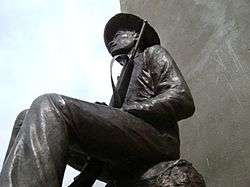Lucio Cabañas
Lucio Cabañas Barrientos (Spanish pronunciation: [ˈlu.sjo kaˈβa.ɲas], 12 December 1938 – 2 December 1974) was a Mexican schoolteacher who became a revolutionary, albeit not a Marxist one. Cabañas regarded Emiliano Zapata as his role model and he never abandoned his Christian faith, as can be seen in Gerardo Tort's film documentary on him.[1]

Teacher
He was born in El Porvenir, of Atoyac de Álvarez, in the state of Guerrero. He became politically active when he studied at the Ayotzinapa Rural Teachers' College and was a leader of the local student union. In 1962 he was elected to the post of General Secretary of the Federation of Socialistic Peasant Students of Mexico. When he began work as a teacher, he also mediated problems at other schools.
Revolutionary
When a rector of Juan Álvarez school in Atoyac demanded that all pupils wear school uniforms, Cabañas argued that some families were so poor they could hardly feed their children, not to mention buy school uniforms. The rector was fired but his supporters remained. When an 18 May 1967 strike action ended in shooting and deaths, Cabañas fled to the mountains and joined the group of Genaro Vázquez Rojas until Vázquez' death on 2 February 1972.
Cabañas led a guerrilla group, the Party of the Poor and Peasants' Brigade Against Injustice. They numbered perhaps 300 members and lived in the Guerrero Mountains. He financed his group through kidnappings and bank robberies.
The Mexican government sent 16,000 soldiers to the Sierra Madre de Atoyac Mountains to hunt him. Fifty of them died during the chase.
In December 1974, Cabañas kidnapped Rubén Figueroa, senator and future governor of Guerrero. When government troops tried to rescue the senator, Cabañas was killed by the Mexican Army.
Some say Cabañas did not die but ended up in jail. If that was the case he probably would have been executed so that sympathizers would believe the rebellion ended with his death. Guerrero was in crisis and the city of Acapulco was suffering a slump in its tourist industry, due to the political violence that had plagued the region in the early seventies.
Legacy
There are a number of legends about him, including that he had five women bodyguards and carried a bag full of money that he distributed to the poor. Those are most likely "tall tales"; similar legends have been built around Pancho Villa and Emiliano Zapata.
In recent, years, Cabañas has become a left-wing icon in Mexico, much like Che Guevara and Subcomandante Marcos. During recent social movements, including the 2006 clashes between teachers and the state government of Oaxaca, Cabañas's face appeared on banners alongside those of Guevara and Vladimir Lenin.
Murder of his widow
On 3 July 2011, it was reported that his widow, Isabel Ayala Nava, was assassinated, along with her sister, as the two women exited a church in Xaltianguis, Guerrero. The killers fired from a vehicle; one then got down and stole the cell phones from the victims. Isabel Ayala had recently been demanding justice over the killing of her brother.[2]
Bibliography
- Ulloa Bornemann, Alberto. Surviving Mexico's Dirty War: A Political Prisoner's Memoir. trans. Aurora Camacho de Schmidt and Arthur Schmidt. Philadelphia: Temple University Press, 2007. ISBN 1-59213-423-8
Notes
- Prepara Gerardo Tort nueva cinta sobre Lucio Cabañas (in Spanish) Archived March 25, 2007, at the Wayback Machine
- El Imparcial. "Asesinan a la viuda de Lucio Cabañas" (in Spanish). Archived from the original on 2011-07-06. Retrieved 11 February 2012.